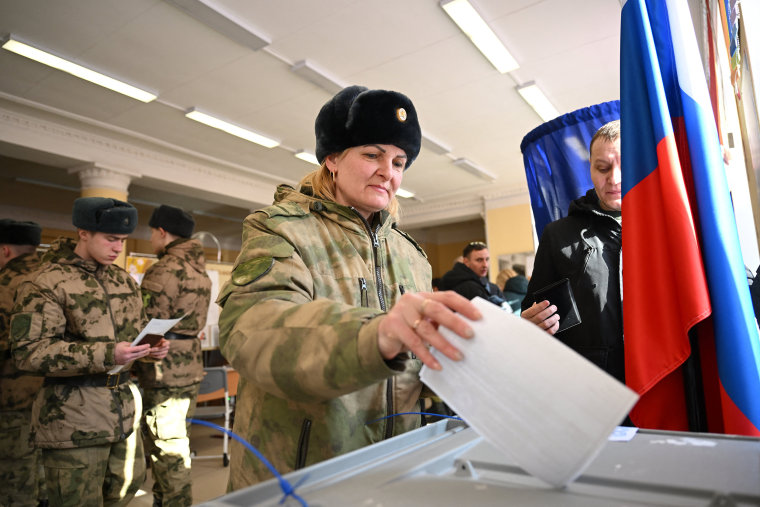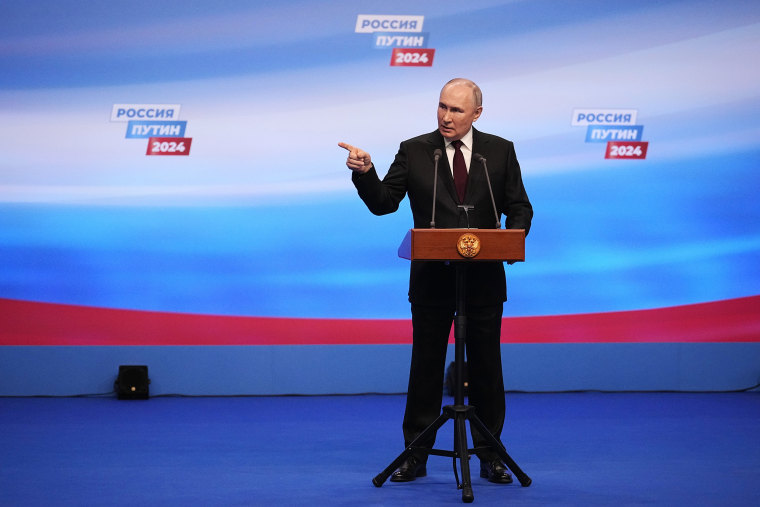President Vladimir Putin’s rule over Russia will be extended for at least another six years, after he claimed a landslide win Monday in a stage-managed presidential election with no real opposition.
The vote was orchestrated to legitimize the leadership of Putin, 71, after a crackdown on dissent that has left his rivals dead, jailed or in exile as his war in neighboring Ukraine enters its third year. Having led Russia for 24 years already, he will soon match Soviet leader Josef Stalin as the country’s longest-serving modern ruler.
Putin received 87.3% of the vote, Russia’s election commission said Monday after more than 99% of ballots had been counted, his highest-ever tally and far more than the 76.69% in 2018. The commission reported that turnout was 77.44%, the highest in Russia’s modern history.
In a news conference late Sunday, Putin hailed the results as an indication of the country’s “trust” in him.

Russian elections have for years been tainted by mass fraud allegations, but the result this time was never in doubt and the overwhelming endorsement claimed by the Kremlin will likely raise even more suspicion.
Speaking with NBC News in Moscow, Kremlin spokesperson Dmitry Peskov said the “unbelievable level” of support for Putin was the “best sign that all the speculation about illegal elections is actually ungrounded.”
The leaders of China, North Korea and Iran were among those who congratulated Putin on his big win. No Western leaders rushed to offer praise. Some, including the U.S., Germany and Britain, dismissed the results as neither free nor fair.
Ukrainian President Volodymyr Zelenskyy said there was no legitimacy in “this imitation of elections,” accusing Putin of being “addicted to power.”
The three other names on the ballot were from parties that have long served the Kremlin’s agenda: Communist Nikolai Kharitonov; leader of the nationalist Liberal Democratic Party Leonid Slutsky; and Vladislav Davankov of the New People party, the youngest candidate, whom the Kremlin tried to present as more liberal-leaning.
None represented true opposition to Putin, however, having supported his agenda and barely campaigned.
Former regional legislator Yekaterina Duntsova and politician Boris Nadezhdin tried to get on the ballot with an anti-war message, but were barred from running by authorities.
The country was also able to vote electronically and over a span of three days, as the Kremlin sought to encourage a higher turnout that would allow it to claim a wave of support for Putin and his war.
Since the full-scale invasion that Putin launched in February 2022, the Kremlin has insisted the entire nation has been “consolidated” around the Russian leader and his growing clash with the West. Putin’s approval ratings have remained high, although gauging public opinion is difficult in Russia as people are often too afraid to speak freely.
The Russians who oppose Putin’s war and politics have been ostracized, often forced into exile or persecuted for their views as part of a sweeping crackdown on dissent not seen since the Soviet era.

Russia’s opposition has been decimated by years of pressure and devastated by the death of its leader, Alexei Navalny, in a remote Arctic prison just weeks before the election, in what his supporters, family and many Western leaders have called a Kremlin-orchestrated murder.
Despite this atmosphere of repression in which mass protests are all but impossible, just before his death Navalny called for people to gather at polling stations on Sunday at noon in a show of dissent.
Navalny’s team shared images of people lining up outside polling stations in Moscow and St. Petersburg in apparent “Noon against Putin,” protests on Sunday.
Navalny’s widow, Yulia Navalnaya, cast her vote in Berlin, telling reporters she voted for her late husband by writing his name into the ballot, as she thanked her fellow citizens for coming out in support.











